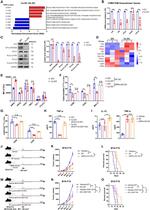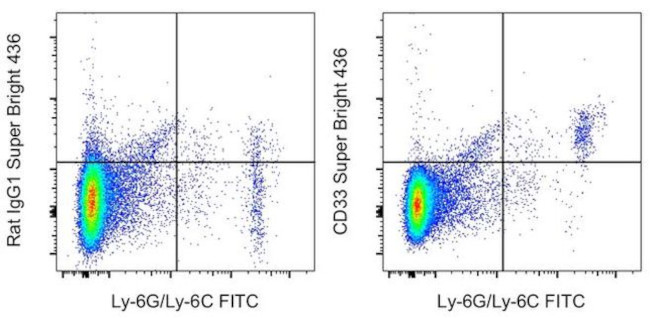Search Thermo Fisher Scientific
Invitrogen
CD33 Monoclonal Antibody (9A11-CD33), Super Bright™ 436, eBioscience™
FIGURE: 1 / 2
CD33 Antibody (62-0331-82) in Flow


Product Details
62-0331-82
Species Reactivity
Published species
Host/Isotype
Recommended Isotype Control
Class
Type
Clone
Conjugate
Excitation/Emission Max
Form
Concentration
Purification
Storage buffer
Contains
Storage conditions
Shipping conditions
RRID
Product Specific Information
Description: This monoclonal antibody 9A11-CD33 reacts with mouse CD33, also known as Siglec3 and gp67. CD33 belongs to the sialic acid-binding immunoglobulin lectins (Siglec) family that binds to sialic acid-containing glycans on cell surface glycoproteins and glycolipids on mammalian cells. mouse CD33 binds to short O-linked glycans of certain mucins and sialyl-Tn epitopes. mouse CD33 is expressed by mature granulocytes, immature myeloid cells, and microglia. Unlike human CD33, mouse CD33 lacks a cytoplasmic ITIM domain and exists as two splice variants that have different cytoplasmic tails. In microglia, CD33 inhibits the phagocytosis of toxic amyloid beta.
Clone 9A11 has been used to characterize mouse CD33 surface expression and function. View Article .
Applications Reported: This 9A11-CD33 antibody has been reported for use in flow cytometric analysis.
Applications Tested: This 9A11-CD33 antibody has been tested by flow cytometric analysis of mouse splenocytes. This may be used at less than or equal to 0.25 µg per test. A test is defined as the amount (µg) of antibody that will stain a cell sample in a final volume of 100 µL. Cell number should be determined empirically but can range from 10^5 to 10^8 cells/test. It is recommended that the antibody be carefully titrated for optimal performance in the assay of interest.
Super Bright 436 can be excited with the violet laser line (405 nm) and emits at 436 nm. We recommend using a 450/50 bandpass filter, or equivalent. Please make sure that your instrument is capable of detecting this fluorochrome.
When using two or more Super Bright dye-conjugated antibodies in a staining panel, it is recommended to use Super Bright Complete Staining Buffer (Product # SB-4401) to minimize any non-specific polymer interactions. Please refer to the datasheet for Super Bright Staining Buffer for more information.
Excitation: 405 nm; Emission: 436 nm; Laser: Violet Laser
Super Bright Polymer Dyes are sold under license from Becton, Dickinson and Company.
Target Information
CD33 is a transmembrane protein of the sialic acid-binding immunoglobulin-like lectin (Siglec) family. It belongs to the immunoreceptor tyrosine-based inhibitory motif (ITIM)-containing molecules able of recruiting protein tyrosine phosphatases SHP-1 and SHP-2 to signal assemblies, and these ITIMs are also used for ubiquitin-mediated removal of the receptor from the cell surface. CD33 is expressed on cells of myelomonocytic lineage, binds sialic acid residues in N- and O-glycans on cell surfaces, and is a therapeutic target for acute myeloid leukemia. Further, CD33 is found on granulocyte and macrophage precursors in the bone marrow, but is not on pluripotent stem cells. CD33 is also expressed on, and is a useful marker for, peripheral monocytes. CD33 is useful for distinguishing myelogenous leukemia cells from lymphoid or erythroid leukemias. Diseases associated with CD43 dysfunction include gallbladder lymphoma and extracutaneous mastocytoma.
For Research Use Only. Not for use in diagnostic procedures. Not for resale without express authorization.
How to use the Panel Builder
Watch the video to learn how to use the Invitrogen Flow Cytometry Panel Builder to build your next flow cytometry panel in 5 easy steps.
Bioinformatics
Protein Aliases: CD33; FLJ00391; Myeloid cell surface antigen CD33; Sialic acid-binding Ig-like lectin 3; Siglec-3
Gene Aliases: Cd33; gp67; Siglec-3; Siglec3
UniProt ID: (Mouse) Q63994
Entrez Gene ID: (Mouse) 12489

Performance Guarantee
If an Invitrogen™ antibody doesn't perform as described on our website or datasheet,we'll replace the product at no cost to you, or provide you with a credit for a future purchase.*
Learn more
We're here to help
Get expert recommendations for common problems or connect directly with an on staff expert for technical assistance related to applications, equipment and general product use.
Contact tech support

